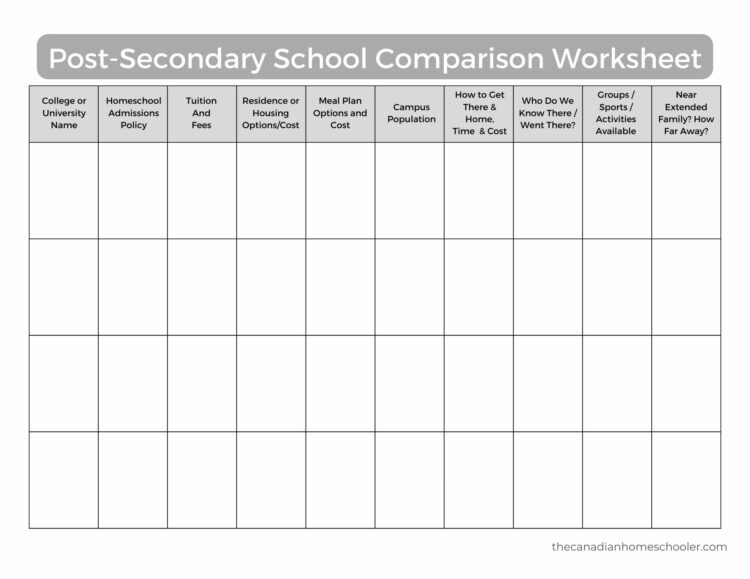Life after high school…how do you decide? What will you do? Are you unsure? Is a gap year or the workforce right for you? Is college, university or trades even an option for homeschoolers? Of course they are! Post-secondary choices for Canadian homeschoolers can be confusing and overwhelming. Here we will provide some guidance!

Most of this post is written directly to the student who is considering their post secondary choices. It is, after all, very important that students at this age are actively involved in their decisions and life direction!
But firstly, a note to parents: if you’re reading this before your student is done high school, or perhaps they haven’t even started high school yet- great! It’s very important that you are proactive while homeschooling high school. You will need to make sure that your student has what they need for post-secondary success if planning on trades, college or university.
If you’ve come to the place where your student is done or almost done high school, and you’re trying to figure this out, all is not lost. Read on! There are ways to figure out most post secondary choices.
There are many options a post-secondary student could take: a gap year, the workforce, trades, college, or university. Let’s have a look at each of them!
A Gap Year
A gap year is a year without formal education or training. People choose a gap year for a variety of reasons including if they are not ready for choosing a post-secondary option, they want more time before leaving home, they want a break, or they would just prefer to have a different experience first. Gap years can be years where you work or travel. The options are wide open! It can be an excellent way to take more time to discover what you want as well as take a break from your studies for the short term. Some options for a Gap year include: travelling, volunteering, taking time to learn some new skills, or working. Do you think this might be right for you? If you’re interested, you might want to check out this podcast episode by Its Not That Hard to Homeschool High School.
Full Time in the Work Force
Another option is to not pursue post secondary education or training at all, either for the short term or long term. This can be part of a gap year, but you might also decide to just join the work force and see how you do with that. Perhaps you already have a part-time job that could offer you full-time hours. The main consideration here is that you would need to know if this job could support you living on your own if you are going that route. If you are living at home and taking more time to consider your options before choosing a post-secondary path, then this is less of a consideration. Working full-time can also be an excellent way to save up for further studies if that is your desire.
Another thing to consider if you are interested in working full time while you wait to decide on a post secondary option, is to see if you can work in a field that interests you. It might help you decide or further solidify your decision about if you want further training in this field.
If you are interested in pursuing entrepreneurship, check out this program. It is designed for middle to high school ages, but it would give an older student some ideas as well!
Figuring Out Your Interests and Post Secondary Education
If you’ve decided you don’t want to take a gap year and you don’t want to enter the workforce without further education, then you need to consider what your options are for post secondary education. Firstly, we need to ask the question: what interests you? Do you know yet if college, university or trades would be the best fit for you? Do you have any ideas of what you would want to pursue as a career? How do you figure this all out?
If You DO Know What Interests You
If you already know what interests you, and have an idea in mind, you need to consider what types of education or training would you need to work in this field. Where is the education or training offered? Then you would go from there and narrow down some programs (more on that later in this article).
If You DON’T Know What Interests You
If you don’t know what you want to pursue, you are not alone. It’s okay to take your time and think it through. Some people know from very young what they want to do, but not many people are like this!
There are some workbooks that help you figure out your interests and strengths that you can get and work through. The books by Brian Harris called My Future: Career/Educational Planning Activities For High School Students, Choosing Your Career: A Self-Directed Guide To Help You Identify Your Interests, Abilities And Values To Help You Choose The Career That Is Best For You, and After High School are 3 excellent guides. What Color Is Your Parachute? for Teens, Fourth Edition: Discover Yourself, Design Your Future, and Plan for Your Dream Job is another book that is worth checking out. These types of books can really help you identify interests and strengths and help you process your thoughts about your future.

Another idea (on its own or in addition to one or more of the above books) is to ask people in your life what they think are your strengths and what they could see you doing. Those who know us well can give us valuable input!
Also, consider gaining experience in a field you might be interested in. You might learn you are no longer interested, or another idea might come out of your time! You could try to find a job in this area, or volunteer and see what you think.
An additional route to gaining insight is to ask for an information interview with a few people that have careers that interest you. Make a list of questions and ask away! Most people are happy to share with someone who is interested in knowing about their career. Some questions to ask include ones such as: What do you most enjoy about your job? What is the hardest part of your job? What advice would you have for someone considering a career in this field? Do you think this type of job is easy or hard to find work in today?
You could even ask to observe someone’s work day, although whether or not that is allowed would depend on the type of job they have. You might be able to find some videos online on You Tube about certain jobs and careers as well.
Another option is to look at websites that list options in the trades and program choices for colleges and universities (search by province or territory) and see if anything catches your interest. If it does, do some more research into it to see what you think.
College, University or the Trades?
After you have decided on what interests you, have a look at what education you need to pursue your career. Perhaps you need an apprenticeship in a trade, or a specific college or university program. What options fit your interest? There might even be more than one route to pursue to get where you want to go.
However, some jobs you can’t be employed at without a university degree, and other jobs would be better served by going to college. For some jobs you need to learn a trade. Each option is different but each one is not “better” than another. Be sure to consider all options! The types of programs offered, the length of the program and the cost varies between each choice.
In this next section, we will dive into how to get into the trades as a homeschooler, and then how to pick the best college or university for you.
Trades
Are you interested in pursuing a trade? Trades is an excellent option for many people. Thankfully it is also starting to be more recognized as an excellent career choice! This next section is written more specifically for Ontario residents, however the information might also be similar where you live and apply to your home province or territory. For this information below, I consulted with Larry La Gamba. Larry is the C.E.O of Trade Links Consulting, where he dedicates his efforts to empowering aspiring entrepreneurs and skilled tradespeople. He actively participates in community outreach initiatives such as The Skilled Trades Mentorship Group on Facebook, which you can join for more information!

When we think of the skilled trades, we often think of plumbing, electrical, and HVAC. The reality is that there are 144 registered skilled trades in Ontario which means there is a trade for everyone! You can find amazing careers like Hairstylist, Early Childhood Educator, and Cook just to name a few. But this is where it gets a bit confusing. Out of the 144, 23 are “compulsory” meaning you have to be registered as an apprentice or a licensed journeyperson, meaning you completed an apprenticeship, completed schooling, and passed the certifying exam and hold a certificate of qualification in that trade. You cannot perform a compulsory trade legally otherwise. There are also non-compulsory trades to look into.
The other 121 trades of the 144 are these trades that are “non-compulsory”, meaning not all of the trades require you to be certified to practice them. About 60 of these “non-compulsory” trades offer certifying exams and are “apprentice-able”, but it depends on where you will be practicing the trade (residential vs commercial, union vs non-union, etc.).
Let’s use painting and decorating in Ontario as an example, a non-compulsory trade with a certifying exam. You can complete an official apprenticeship and become a certified journeyperson in this trade, but it is not necessary depending on where you intend to practice the trade. Many painters have worked for a painting company and then went off to start their own painting business without completing a formal apprenticeship or any certifying exams. This is also seen with residential renovation contractors that do flooring, drywall and tiling. All those trades are classified as non-compulsory and “apprentice-able”, but a lot of practitioners in the residential realm do not complete an apprenticeship for these trades.
Things get tricky as a homeschooler as a vast majority of “apprentice-able” skilled trades that are either compulsory or non-compulsory require completion of Gr. 12 and an Ontario Secondary School Diploma (O.S.S.D.) or equivalent to be eligible. Homeschoolers who have not chosen to do an accredited online program for high school (where they graduate with their OSSD) will have to pursue another route to work in some trades.
But don’t despair, there are ways as a homeschooled student to still do trades. These options are:
- You can get your official high school credits at home online through places such as VLC, ILC, another online private school like VHS or CVS.
- Some schools might allow you to do PLAR testing (Prior Learning Assessment Recognition) to gain credits towards the O.S.S.D (contact your local high school about if this is an option), however, most would require you then finishing your high school credits at school to get your diploma.
- You can get the Ontario Secondary School Diploma equivalent by obtaining an ACE certificate from a public college. According to this government of Ontario webpage, “colleges recognize the ACE certificate as a high school equivalent for admission to college programs.” There are similar academic upgrading courses available with other colleges across Canada.
- If none of this is not a possibility, you can try entering college programs as a mature student. This route may involve aptitude testing before being admitted.
- Other suggestions are to look into government-funded pre-apprenticeship programs, skilled trades programs offered by agencies like the Centre for Skills in Burlington, Ontario, or to look into a non-compulsory trade like painting or ones that are high in demand that are not on the list like swimming pool technician.
Overall, it can be a bit complicated to get into the trades as a homeschooler, but there are ways to work around these complications!
Are you hoping to start your own business in the skilled trades? Check out this post by Larry La Gamba all about entrepreneurship in the trades.

College or University
You might have decided that you want to pursue college or university. However, when considering colleges and universities, there are so many things to look at. It can be overwhelming! In this next section we will look at how to get into college or university as a homeschool student, and what types of things you want to consider when choosing where to apply.
Homeschool Admission Policies
Non-official, Unaccredited Route for High School
First, let’s talk about if you have gone the non-official unaccredited route for high school (you don’t have an official high school diploma issued by your province or territory). Your first thing you will need to consider is what is the homeschool admission policy of the college or university. This varies per university or college so you really do need to contact each one and ask if that information is not already available on their website.
It’s very important that you do your research ahead of time and make sure you have all the prerequisites and any other things that the school requires. You may need to do additional tests or submit a portfolio, or both. There are a few schools that will only accept accredited Grade 12 courses if you are applying directly out of high school. Be aware of this and decide to pursue accredited courses for Grade 12 if needed (and some places might need you to do the pre-requisites to even do those Grade 12 courses). But don’t despair, there are still ways to figure things out if you get stuck.
What if you are already at the end of high school, you went that unofficial, unaccredited route, you haven’t done your research ahead of time, and now you are considering your options and it doesn’t look good? You need something to get into the program that you want but you don’t have it. Here are some options.
One thing you can do is to look into whether your school and program of choice would accept you later if you waited and applied as a mature student (they don’t consider your grades from high school at that point), first did some credits through a college (if you desire university), or did some online credits through the open, online-only Athabasca University.
Another option is deciding to pursue academic upgrading. In Ontario, for example, the ACE certificate is a form of academic upgrading that is considered as a high school equivalent for getting into college programs. There are similar programs across Canada if you search for academic upgrading. You can even pursue college and then transfer to university!
There are so many ways to go about getting admitted to colleges and universities. Be sure to call the school(s) you are interested in and ask them about all your options for getting into their programs as a homeschool student.
Online, Accredited Route for High School
Secondly, let’s talk about if you have taken your high school courses through an online accredited route that is recognized in your province, and have your province’s official diploma. In this case, you don’t have to worry about homeschool admission policies. Your online school should be able to help you figure out the application and admission process for your situation. Keep reading, however, because the rest of the information does apply to you (or anyone looking at college or university options!)
If you figured out that you need a college or university education to pursue your chosen career, you will need to consider which schools offer programs to get you where you need to go. Provinces and Territories have overall “landing pages” for all colleges and all universities in that province. It can be an excellent source of information and help you narrow down your choices of schools.
Next, we will examine all the considerations when you are looking at which program and school to attend. We also have a free, printable spreadsheet to help you organize your thoughts as you consider your options! Check it out near the end of the post.
Program Costs
When you are looking at various universities or colleges and trying to decide, one of the most important things you will need to consider is cost. Tuition, books and other fees can really add up. Costs for post secondary options can vary widely depending on school and program. Its best to know ahead of time what it will cost you!
Residence/Housing and Food Costs
Are you going to do your studies online? If so, will you live at home? Will you be expected to contribute food and rent or will that be provided? If you are going to attend school in person, are you going to want to live in residence? What are the options and costs for living there? Does the school offer single rooms or might you have to share? Is that a problem for you to have a room mate? Perhaps you want to live off campus- what are the options and typical costs? If you live in residence, can you cook for yourself or will you need a meal plan and eat in the cafeteria? What is the associated cost?

Campus Size
Another thing to consider is the campus population. Are you a person that likes being around lots of people and can see yourself in large lecture theatres with hundreds of people? Or are you a person who would prefer smaller classes with fewer students? Each school has a different feel to it based on the student population. If you are doing online studies, this is less of a consideration for you.
Costs and Methods of Transportation
If you are attending school in person, figuring out what it will cost to get there and back as well as how you will do so and how long it will take is another part of your decision. Will you drive in a private vehicle, carpool, take a bus, train or airplane? Each one of these options have their own associated times, costs and hassles.
Gather more Information
Do you know anyone who has gone to the school you are considering, either has graduated or is currently going there? They can be a great source of information. Ask them if they would mind answering some questions. See what they have to say about their school! It could help you understand better if it’s a good fit for you.
If you are attending in person, is there anyone you know who lives nearby the school you are thinking about? This might be an option for off-campus housing or support as you adjust to your new home.
Campus Tours

Campus tours are another great way to gather information if you are looking to attend school in person. A tour can really help you get a feel for the college or university you are thinking about. Actually visiting is the best option in terms of really understanding the feel of the campus. A private tour is the best way to do a tour as you will get more time to see what you want and more of your questions answered.
However, distance might be a factor when considering going to a campus tour. Sometimes campuses have special rates with hotels for those who are travelling, or even a small discount in tuition for those who travel far for a tour. Be sure to ask about any perks! If the distance is still too far for you to consider going in-person, be sure to check if the school has an online virtual tour.
Sports and Activities and City Life
If you are attending in person, are you a person who really likes swimming, hiking trails, clubs? Are you going to need to look for a church home when you get to your new school? Check out and compare your options ahead of time. Maybe the school having a swimming pool or not is a deal breaker for you. Maybe the library at the school doesn’t feel like enough to you. Perhaps you excel at a particular sport and only certain schools have teams for it. Do you like the city where the school is located? Check these things out!
Other Considerations
Is there anything else that stands out to you about the school you are considering? Do they offer online options? Is that something you would consider? Perhaps you love the look of the campus, or you are pumped about the city itself. Be sure to take note of this.
Would you prefer to sort through all these questions with the help of a comparison worksheet? Download it below, for free!

Final Thoughts
What to do for post-secondary is a big question for all young people whether they have been homeschooled or not. It can be nerve-wracking, confusing and there can be many different emotions surrounding the decision. Take your time to really consider the options whether that is joining the work force, taking a gap year, or choosing to go into trades, college or university.
- Engaging Ways to Learn About Canada’s Mammals - April 17, 2024
- Exciting Ideas for Studying Canadian Immigration in your Homeschool - March 17, 2024
- Canada’s Provincial and Territorial Birds: A Quick Guide for your Homeschool - February 16, 2024
